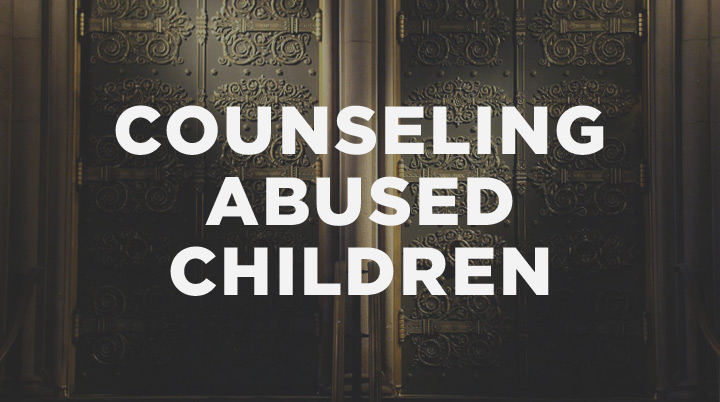Latest
-
Objections to the Christian Faith from the Unchurched and De-Churched
 Tue Dec 02, 2014
Tue Dec 02, 2014
by Resurgence -
Craig Groeschel: We Innovate for Jesus
 Tue Oct 14, 2014
Tue Oct 14, 2014
by Resurgence -
Mark Driscoll: Revelation
 Tue Oct 07, 2014
Tue Oct 07, 2014
by Resurgence -
RESURGENCE LEADERSHIP #034: JOHN PIPER, WHY I TRUST THE SCRIPTURES, PART 2
 Tue Sep 30, 2014
Tue Sep 30, 2014
by Resurgence -
Resurgence Leadership #033: John Piper, Why I Trust the Scriptures, Part 1
 Tue Sep 23, 2014
Tue Sep 23, 2014
by Resurgence

Archives
8 notes on counseling abused children

How to counsel a child in the wake of abuse is not always evident. Pastors should be actively prayerful and studious in learning how to minister to children in these critical moments.
A solemn charge to care
In a great many of his published prayers and addresses, the 19th-century Lutheran theologian C.F.W. Walther recognized that Christians are charged with grave responsibilities for the care of children and that God will hold us accountable for our unfaithfulness in discharging this duty. Walther called children “far more precious than gold or silver, than house and home” and said that God would one day ask us, “Where are the children I have given you? Have any of them been lost?”
Reflecting his belief that God was especially concerned with the welfare of children, Walther prayed, “Lord Jesus, by your holy Word you have again warned us against despising any one of these little ones, for their angels always behold the face of your Father in heaven.” In the care of children, Walther admonished his parishioners to “leave no stone unturned to keep them safe from the evil foe and the world.”
Refrain from platitudes.
Given his childhood history and his pastoral history in applying the law and gospel in cases of violence and sexual exploitation, it is more than conjecture to suggest that if Walther were alive today he would take heed of the many studies documenting the devastation that abuse has on a child’s spirituality.
Accordingly, pastors wishing to follow the spirit of Walther in applying law and gospel to victims of child abuse may begin by reviewing the Adverse Childhood Experience (ACE) studies and remind themselves of the shattered lives left from child abuse.
With these studies in mind, a pastor contemplating the words of our Savior will likely find a clear course of action—the liberal use of the gospel, and the sparing use of the law. To this end, the following guidelines may be of assistance.
1. Assure the victim of Christ’s empathy
A victim may question the goodness of God, in part, because of the statements made by the offender. The victim may also question whether or not God can truly understand his or her pain or experiences. When this is the case, a Christian pastor can assist by showing the child a very different image of God. . . . Tell the suffering soul that Jesus understands maltreatment because he was horrifically mistreated.
2. Apply the gospel compassionately
The victim may have extreme guilt over the usage of drugs or alcohol, may have suffered from myriad failed relationships or a host of other problems. The pastor should recognize the enormity of this pain and assure the survivor of God’s forgiveness and love. Simply stated, the pastor must display the compassion of our Savior.
3. Help the victim get appropriate health care
Pastors should not ignore the medical and mental health needs of those struggling with drugs, alcohol, sexual impulses, anger, or any number of other conditions often found among those ripped from childhood through abuse. In helping the child access mental health services, pastors should seek a mental health provider current on the literature addressing childhood trauma and who is skilled at providing counseling or other services.
4. Refrain from platitudes
Many well-meaning theologians are quick to offer a biblical platitude to complex spiritual struggles. When this happens, a victim often feels frustrated and looks elsewhere for guidance.
5. Avoid focusing on the victim’s sins
If the ACE studies are accurate, a pastor or other Christian meeting with a boy or girl, man or woman, abused as a child may very well see the aftermath of this exploitation—a child or adult who has turned to alcohol, drugs, smoking, sex, food, etc. in search of solace. When confronted with such a pilgrim, a pastor may be tempted to focus his or her gaze on the specks in the victim’s eye, and avert attention away from the gaping hole in the victim’s heart—a hole that can only be filled by the gospel.
6. Don’t make forgiveness into law
Forgiveness should be a change of heart rooted in the gospel. Many victims of abuse struggle with the issue of forgiveness and, when forgiveness does occur, it often takes time (pdf).
7. Respond with caution when a victim asks to confront the perpetrator
If they nonetheless choose to confront the offender, the survivor should be fully prepared by a mental health professional to process the event before and after the confrontation. It may also be wise for a pastor, counselor, or other support person to be with the victim during any confrontation so that the support person can immediately challenge the cognitive distortions the offender may direct at the survivor.
8. Seek the lost
Preaching the gospel to abused children involves more than waiting for one to appear in our office or even our churches—it means an active search for the lost. Given how many of these children are driven from the church by Christians who violated their bodies in the name of God and by other Christians who, at best, responded passively, there is an urgent need for Christendom to adorn itself in sackcloth and ashes and then change course.
Learn more in Victor Vieth’s recent article in the Journal of Psychology and Theology.